ISLAMABAD: In a bid to counter rising inflation and alleviate the economic burden on citizens, the government has decided to reduce duty and taxes on the supply of edible oil.
The announcement was made by Federal Minister for Planning, Development, and Special Initiatives, Asad Umar, on Monday. The move aims to provide relief to consumers, particularly in the face of escalating prices of essential commodities.
Key Measures to Tackle Inflation:
1. Reduction in Sales Tax: The sales tax on cooking oil is set to decrease from 17% to 8.5%. This substantial reduction is expected to have a direct impact on the retail price of cooking oil, making it more affordable for consumers.
2. Customs Duty Adjustment: The government plans to adjust customs duty on cooking oil from Rs 10,000 per ton to Rs 5,000 per ton. Additionally, a 2% additional customs duty is entirely withdrawn. These changes aim to further ease the financial burden on consumers by reducing the cost of cooking oil.
3. Price Impact: As a result of these adjustments, the price of cooking oil in Pakistan is anticipated to decrease by approximately Rs 50 per kilogram. This reduction is a significant step in making essential cooking ingredients more accessible to the general population.
Context and Rationale:
Asad Umar highlighted the global and domestic economic factors contributing to the current challenges. According to World Bank data, crude oil prices surged by 81% globally within a year. However, the increase in petrol prices in Pakistan was comparatively lower, standing at 17%. Similar patterns were observed in the prices of Liquified Natural Gas (LNG), where the international increase was 135%, but in Pakistan, it was 64%.
Cooking oil prices, both globally and in Pakistan, saw an increase of 48% and 38%, respectively. The minister acknowledged the impact of these fluctuations on local consumers’ purchasing power.
Tax Adjustments on Petroleum Products:
As part of broader economic strategies, the government has taken steps to rationalize taxes on petroleum products. The General Sales Tax (GST) on petrol has been reduced from 17% to 6.8%, and the Petroleum Development Levy (PDL) is now Rs 5.6 per liter. Similarly, GST on High-Speed Diesel has been lowered from 17% to 10%. These adjustments are aimed at mitigating the impact of international price hikes on domestic fuel prices.
Asad Umar provided historical context, mentioning that during the previous government’s tenure, taxes on petroleum products were significantly higher, with rates reaching as high as Rs 101 per liter. The current government has implemented reforms to reduce the tax burden on consumers.
Ehsaas Program and Future Relief Measures:
The minister emphasized the government’s commitment to providing relief to citizens. He highlighted the Ehsaas program, through which the government is offering relief of over Rs 260 billion, compared to Rs 121 billion in 2018. Furthermore, Prime Minister Imran Khan is set to announce details of a targeted subsidy program in the coming days to protect the lower segments of society from inflationary shocks.
As the global economy grapples with challenges, including supply chain disruptions and increased demand for commodities, the government is optimistic that prices may start receding from March 2022. The comprehensive strategy aims to balance economic stability while prioritizing the well-being of the population.
In addressing concerns about the strictness of the present International Monetary Fund (IMF) program, Asad Umar attributed the stringent measures to the need for drastic reforms in macroeconomic sectors due to the previous government’s economic policies. He assured that the government is actively pursuing reforms and taking actions against mafias and cartels to ensure a more resilient and transparent economic environment.
